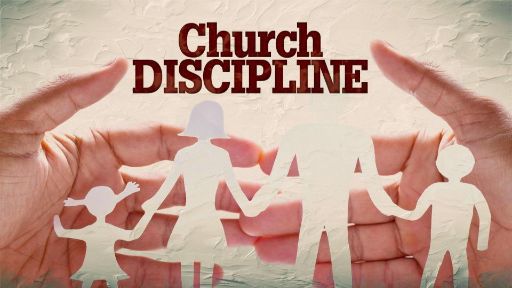-
If There Is Sin, What Then?
Contributed by Brian Hamrick on Nov 28, 2017 (message contributor)
Summary: The ins and outs of how to practice church discipline for the glory of God and the good of the church.
If There is Sin, What Then?
Matthew 18:15-20
(Given at an associational meeting)
All of our churches have the same main problem. It isn’t the number of baptisms we had last year. It isn’t how much we gave to missions. It’s simple. Your church has this problem, my church has this problem, every church on earth has this problem because every human being on earth has this problem. Sin.
Sin is the most basic and most fundamental problem of every church. That rebelliousness that tells God, “I’ve got another way of doing it.”
How do we move away from sin’s influence in the church to grow in holiness? Many churches preach against sin, yet do virtually nothing about it.
Jesus gave us very clear commands of how to deal with sin.
Matthew 18:15-20 (ESV)
“If your brother sins against you, go and tell him his fault, between you and him alone. If he listens to you, you have gained your brother. But if he does not listen, take one or two others along with you, that every charge may be established by the evidence of two or three witnesses. If he refuses to listen to them, tell it to the church. And if he refuses to listen even to the church, let him be to you as a Gentile and a tax collector. Truly, I say to you, whatever you bind on earth shall be bound in heaven, and whatever you loose on earth shall be loosed in heaven. Again I say to you, if two of you agree on earth about anything they ask, it will be done for them by my Father in heaven. For where two or three are gathered in my name, there am I among them.”
You know, when I was in school, we got taught how to deal with one of the most destructive forces on earth: fire. If we were ever in a fire and our clothes caught flame, the instructions for our own safety and survival were very simple: STOP, DROP, and ROLL. For anyone who would do this, they would be assured the flames would hurt them no more. But for anyone who would not follow these simple commands, the fire would continue its damage until it consumed its victim entirely.
There is something more destructive than fire. It’s sin.
Yes, brothers and sisters, the church is made up of redeemed sinners, but it is not meant to be a place for sin to breed and grow. It is not meant to be a place where sin is given a wink here, a chuckle there, a blind eye, or an embrace of tolerance within the church.
I mentioned to one of our brothers here that I was considering preaching a Scripture passage that dealt with church discipline, and he jokingly said for a title, “My way, or the highway.” Some people think that’s what this is all about.
I mentioned to a brother who was heading off to seminary last fall about the church’s desperate need for practicing church discipline as Jesus taught it, and he told me he had never heard of it before.
So I don’t assume this is familiar to each of you. Discipline is not a well-accepted word in this day and time. We think it’s overly restrictive, and that we should ignore it for the sake of personal freedom.
I hope you won’t tune this out- some of you will be wondering how this helps bring people to Christ, how this really is a part of our mission, and I will answer those things.
Now, I want you to relax for a moment. Church discipline is not about a witch hunt. It’s not about practicing a judgmental attitude, or mean-spiritedness. It’s not about humiliating another person. It’s not a way to get even with someone who wronged you. There are a lot of ways it should never be done, because it can be done wrong- yet it is equally wrong to avoid doing it, as if Jesus never said anything about the subject.
Some of you may hear this message and grow fearful I am teaching some form of perfectionism in order to be accepted by God. Let me assure you I am not- the cross signifies God graciously accepts repentant sinners who believe the Gospel, not those who have performed a perfect life. But on the other hand, we must not be neglectful of the call upon us to holiness, for God has said, “Be holy, as I am holy.” Church discipline is more about restoration than punishment. It’s about people being reclaimed, and keeping each other from sin. It is like surgery that corrects something wrong so that more serious injury does not result.
Baptist historian Gregory Wills discovered that after the Civil War, discipline in churches declined in part due to churches growing larger. He said, “Urban churches, pressed by the need for large buildings and the desire for refined music and preaching, subordinated church discipline to the task of keeping the church solvent. Many Baptists shared a new vision of the church, replacing the pursuit of purity with the quest for efficiency. No Baptist leader arose to call for an end to congregational censures. No theologians argued that discipline was unsound in principle or practice… It simply faded away, as if Baptists had grown weary of holding one another accountable.”

 Sermon Central
Sermon Central



